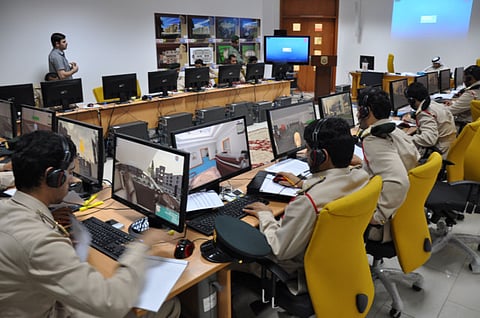Dubai Police is rapidly becoming a techno-force
Interest in technology: Security force opt to use virtual training for its personnel

Dubai: Dubai Police is rapidly becoming a techno-force. The scope of Dubai’s interest in modern technology takes on a new dynamic as Dubai Police opt to use “virtual training” for its forces to sharpen skills and study matters of real-world life and death.
The training quality of virtual worlds is rapidly becoming a valuable tool, and that virtual training can provide a genuine service to officers looking to improve their skills.
Police and military officers or new cadets can use virtual law enforcement training as an excellent resource for simulating real-world situations where quick thinking and precise actions are required.
The officers are playing “serious games” that digitally rebuild real crime and accident scenes from the city onto a computer screen. It could be a celebrity murder, jewellery shop robbery or a massive car crash, the police force’s virtual training and crime scene reconstruction sections put cadets in the middle of the action. The games use actual case details like photographs, security camera footage, documents — plus three-dimensional scans of rooms or streets — to create life-like virtual worlds where cadets can “walk around” and uncover evidence.
Crime scene
“You cannot always place trainees at the scene because of safety issues, environmental concerns or security reasons so we are making police force learn how to deal with potential crime scene situations with virtual technology testing officers in the virtual world helps them overcome routine mistakes,” said Lieutenant Colonel Dr Ahmad Bin Subaih, head of the Virtual Application Development Centre at The General Department of Human Resources at Dubai Police. “These games help trainees to make the transition to real-life situations,” he said.
Gaming also lets them make mistakes which can otherwise be costly in the real world, he added. Besides their own instincts, players can use many tools. They can use measuring tape to size up car skid marks; snap pictures of impact points; collect samples like glass pieces for lab tests; use flash lights and even call a police operations room. “Their performance is tracked. We can play back [the episode] and view it in 3D, zoom in or enter the game at any point,” he said.
He added: “We create digital facial reconstructions based on remains of skulls,” said Dr Bin Subaih. He added that more importantly, the progress of individual cadets can be tracked from initial intake to graduation, meaning cadets who fall short in one area can brush up on their policing skills before they receive their first real-world call.
Virtual tracking also helps the police department zero in on officers with particular skill sets, easing the difficulty of specialisation. By looking at cadets who consistently score at the top of their class in certain virtual world programs and comparing those results to real-world testing, departments could easily develop a promising cadet into a specialist.
“We are mating learning context to on-the-job performance,” said Dr Bin Subaih.
“The idea of virtual training started on how to train traffic police on traffic accident investigation and then the idea developed and now we have training from Dubai Police, Ministry of Interior, Armed Forces and even from law enforcements in other countries,” he said.
He said all and every thing about virtual training is done at our laboratories at the VADC.
“We use real crimes that happened one day and we reconstruct the crime scene to train police on it,” he said. He said also school children and universities visit the centre for leaning and training.
“We have every day training sessions attended by more than 20 to 50 trainees,” he said. He said this centre is the first of its kind in the region in developing games for purpose of training with in-house game development studio.
The centre is specialised in developing games and animated videos for training police and armed forces and also for raining public’s awareness.
The VADC established in 2008 as a small section before it is turned to be a department in 2010.
“The centre has great responsibility in applying not only the latest technological trends and the highest standards of development quality in order to face the security challenges in this region and in the world but also to develop games to help create a technological infrastructure for providing training and awareness. It aspires to do that through the use of virtual environment in order to provide a safe and practical environment to support the currently used approaches, such as the theoretical and practical approach to bridge the gap between theory and practice,” he said.
Sign up for the Daily Briefing
Get the latest news and updates straight to your inbox



